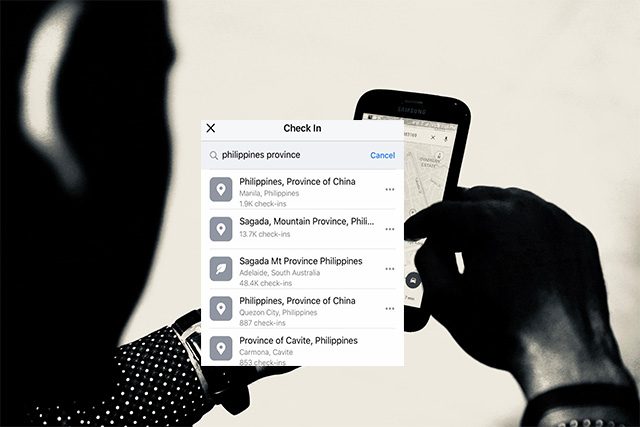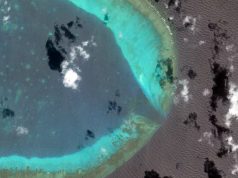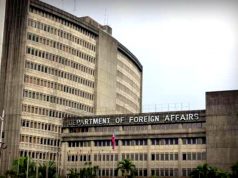Filipinos called on their fellow citizens to mass report the “offensive” geotag on Facebook and Instagram that identified the Philippines and some parts of the country as “Province of China” amid the continuous aggression of Beijing in the West Philippine Sea.
Geotags such as “Philippines, Province of China” appeared as an option for users as they try to “check in” or pin the “location” of their posts on social networking services.
As of this writing, the certain geotag option is still available on both platforms.

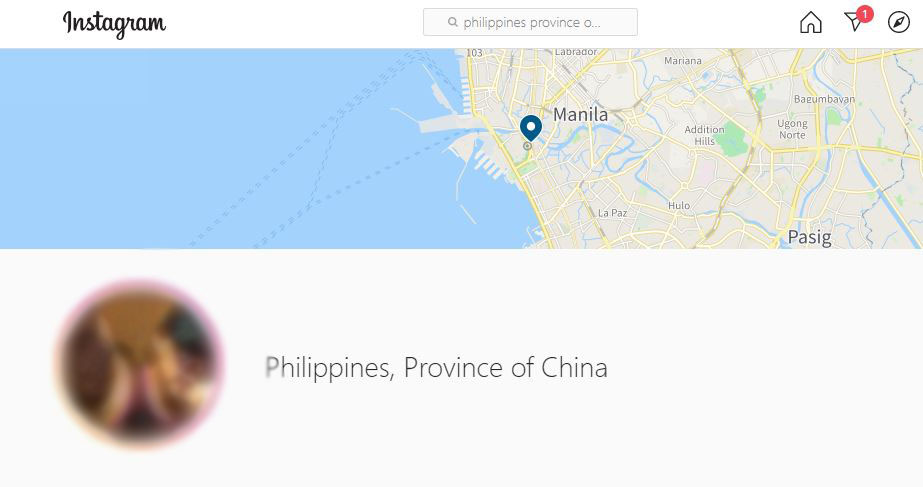
“Our heroes did not sacrifice their lives only for our country to be called ‘Province of China.’ This is an insult. A blatant disregard for our sovereignty. If you are still not enraged by this, you have no right to call yourself a Filipino,” a Facebook user wrote.
“LET US NOT ALLOW CHINA AND ITS LAPDOGS TO INSULT THE MEMORY OF OUR HEROES. WE ARE PROUD FILIPINOS. THE PHILIPPINES IS OURS AND OURS ALONE,” another enraged online user wrote.
Several Filipinos then appealed to the public, particularly their fellow citizens, to report the geotag and other similar tags which wrongly indicate that the country and some parts of it are under China’s jurisdiction.
Others even shared step-by-step guide on how to report the wrong geotag option which they called “a sick joke.”
Users on Facebook can report the geotag by clicking the three dots on the right side of the tags and selecting options such as “inappropriate content” or “not a public place.”
‼️Please help in mass reporting this Location tag‼️Philippines is a sovereign country🇵🇭 We are not and never will be a…
Posted by Iris Quintana on Friday, May 15, 2020
Sen. Risa Hontiveros similarly condemned the geotags and said that it should be taken seriously even though it could be a joke, adding that it is an insult to Filipino fisherfolks who were harassed by Chinese vessels in the Philippine maritime territories.
She also called for the mass report of the geotag and added screengrabs on how it could be reported as well.
“Kahit biro pa itong ‘Philippines Province of China’ na geotag, wag nating hayaang ma-normalize ito. Let’s mass report!” Hontiveros said.
Kahit biro pa itong Philippines Province of China na geotag, wag nating hayaang manormalize ito. Let’s mass…
Posted by Senator Risa Hontiveros on Saturday, May 16, 2020
“Katunog siya ng mga mangingisda nating tinataboy mula sa sarili nating mga karagatan. Katunog siya ng Wow China na ini-ere sa sarili nating radio station at katunog din siya ng mga isla natin na onti-unti nilang sinasakop,” Hontiveros added in a video.
Last week, Filipinos expressed their outrage when “Radyo Pilipinas,” a state-run radio station, was discovered to air a cultural-feature program called “Wow China” which online users called a “Chinese propaganda.”
RELATED: Timing of Radyo Pilipinas’ ‘Wow China’ airing questioned but segment is 2 years old
What is geotagging?
Geotagging is the process of adding geographical information to various media in the form of metadata, according to Techopedia.
The data usually consists of coordinates like the latitude or longitude but it can also include details like distances and place names.
Geotagging in terms of digital platforms can be used to find location-specific websites, news and other information. It is based on the positions and coordinates of the user which are directly taken from the global positioning system or GPS.
Other social networking websites allow users to “check in” using the geotagging feature to allow their friends to know their exact location or where they are logged in.
‘Province of China’ and West Philippine Sea
The phrase “Province of China” first floated when the Philippines’ own president, Rodrigo Duterte, joked about ceding the archipelago as a province of the Asian giant in February 2018.
The chief executive uttered laudatory remarks to his Chinese counterpart in front of a speech involving Chinese-Filipino businessmen and insisted that Beijing had promised not to build a man-made island in Scarborough Shoal.
“I respect Xi Jinping, they assured us they will not build anything on Scarborough,” Duterte said during an anniversary celebration of the Chinese Filipino Business Club.
“He (Xi) is a man of honor. They can even make us ‘Philippines, province of China,’ we will even avail of services for free,” he added in jest.
Months after Duterte made the joke, red tarpaulins bearing the phrase “Welcome to the Philippines, Province of China” appeared on several footbridges across the metro.
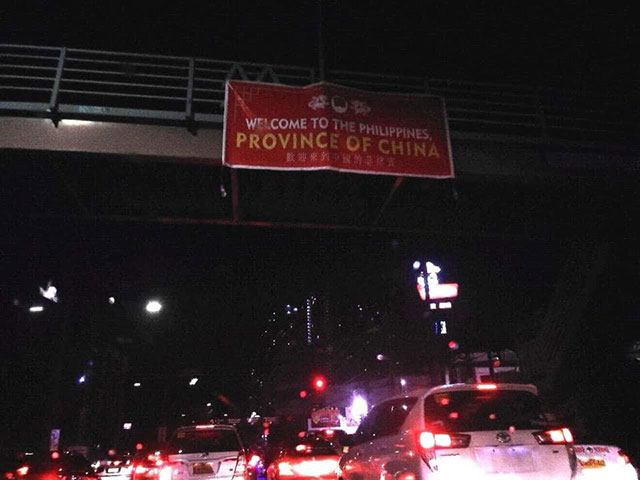
The release of these banners coincided with the second anniversary of the UN Arbitral Tribunal ruling in July 2016 wherein the Permanent Court of Arbitration awarded the Philippines sovereign rights over the West Philippine Sea.
China has been aggressively claiming maritime territories in the aforementioned areas—a portion of the disputed South China Sea which is claimed by the Philippines—despite the ruling and has since remain consistent in its activities in the disputed waters.
Even as the global community faces a significant health crisis, Beijing has been relentless in its encroachment.
Some of its recent activities include establishing the districts of Nansha (Spratly Islands) and Xisha (Paracel Islands) under the jurisdiction of its self-declared Sansha City.
China also launched research stations on Fiery Cross (Kagitingan) and Subi Reefs in the Spratlys, which are being claimed by the Philippines.
Fiery Cross and Subi Reefs are considered part of Beijing’s “big three” militarized islands in the Spratlys which have been turned into a fortified airbase in 2017.

